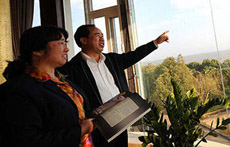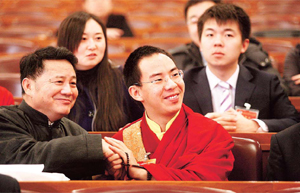Voice from London
(chinadaily.com.cn)
Updated: 2010-03-02 13:37
Times: China Premier Wen Jiabao says world risks double dip recession 15/03
Wen Jiabao, the Chinese Premier, closed the National People’s Congress session today with grim warnings that the global economy risked plunging into double-dip recession and that China itself faced a “complicated” year.
Mr. Wen’s note of alarm for the global economy was based on the still high state of unemployment in many of the markets that buy Chinese exports. Sovereign debt problems and exchange rate instability, he said, created the risk that the world economy could tumble back into a second recessionary downturn.
His speech included an aggressive defence of Beijing’s currency policy – the emergency decision made at the height of the financial crisis to re-peg the yuan and stop the steady appreciation against the dollar which began in 2005.
Mr Wen’s bearish remarks on the global economy come amid a rising sense of unease in some quarters over the state of China itself. It is the key driver of global commodity prices, poised to overtake Japan as the world’s second largest later this year but rife, some suggest, with potential sources of domestic trouble.
Telegraph: China opposes US and EU demands for yuan revaluation 15/03
The premier's comments offered little comfort for US President Barack Obama as he considers growing demands from US businesses and unions to impose trade sanctions against cheap Chinese products. He has urged China to adopt a more "market related exchange rate" and is considering whether to go a stage further and name China as a "currency manipulator."
An increase in tension has been fuelled by US arms sales to Taiwan and the visit of the Dalai Lama to Washington along with the attacks on Google which has threatened to withdraw from China unless it can be assured it can run its search engine without interference.
So far the deterioration in relations has been reflected by an increase in the level of rhetoric but economists fear President Obama may be forced into tougher action.
There had been hopes that Premier Wen's press conference, the Chinese leadership's traditional platform for sending coded signals to the rest of the world about policy shifts, would provide some pointers to change but economists saw no sign of any movement on the crucial currency question.
Mr Wen insisted that China would decide the timing of any currency change rather than be pushed into it.


